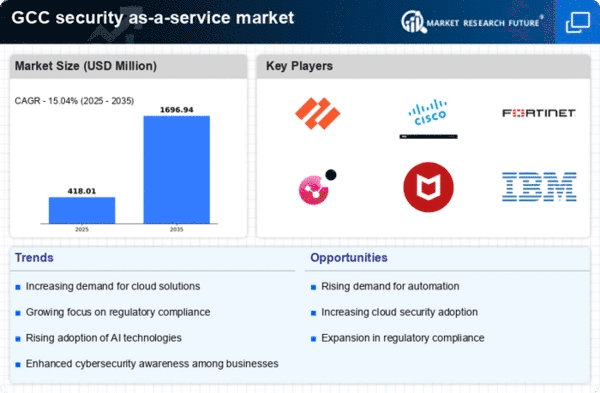Regulatory Pressures
The security as-a-service market is also being driven by increasing regulatory pressures in the GCC. Governments are implementing stricter data protection laws and compliance requirements, compelling organizations to enhance their security postures. For instance, the introduction of the Personal Data Protection Law in various GCC countries mandates that businesses take adequate measures to protect sensitive information. This regulatory landscape is pushing companies to adopt security as-a-service solutions that can help them meet compliance requirements efficiently. As organizations strive to avoid hefty fines and reputational damage, the demand for security as-a-service offerings is likely to surge, further propelling market growth.
Rising Cyber Threats
The security as-a-service market is experiencing growth due to the increasing frequency and sophistication of cyber threats in the GCC region. Organizations are facing a myriad of challenges, including ransomware attacks and data breaches, which have prompted a shift towards more robust security solutions. In 2025, it is estimated that cybercrime could cost businesses in the GCC upwards of $6 billion annually. This alarming trend has led companies to seek comprehensive security as-a-service solutions that can provide real-time threat detection and response capabilities. As a result, the demand for managed security services is likely to rise, driving the overall growth of the security as-a-service market.
Cost Efficiency and Scalability
Organizations in the GCC are increasingly recognizing the cost benefits associated with adopting security as-a-service solutions. Traditional security measures often require significant upfront investments in hardware and software, which can be prohibitive for many businesses. In contrast, security as-a-service offers a subscription-based model that allows companies to pay only for the services they need, thus optimizing their budgets. Furthermore, the scalability of these services enables organizations to easily adjust their security measures in response to changing business needs. This flexibility is particularly appealing in a dynamic market environment, suggesting that the security as-a-service market will continue to expand as more companies seek cost-effective and scalable security solutions.
Increased Awareness of Cybersecurity
There is a growing awareness of cybersecurity issues among businesses in the GCC, which is significantly influencing the security as-a-service market. As high-profile cyber incidents make headlines, organizations are becoming more proactive in addressing their security needs. This heightened awareness is leading to increased investments in security solutions, with many companies recognizing that a reactive approach is no longer sufficient. In 2025, it is estimated that spending on cybersecurity in the GCC will reach $10 billion, reflecting a commitment to safeguarding digital assets. This trend indicates that the security as-a-service market will benefit from a more informed customer base that prioritizes security in their operational strategies.
Shift Towards Digital Transformation
As businesses in the GCC embrace digital transformation, the need for robust security measures becomes paramount. The rapid adoption of cloud computing, IoT devices, and mobile applications has created new vulnerabilities that organizations must address. The security as-a-service market is well-positioned to cater to these evolving needs, providing tailored solutions that protect digital assets. In 2025, it is projected that the digital transformation initiatives in the region will lead to a 30% increase in demand for security services. This shift underscores the importance of integrating security into the digital landscape, suggesting that the security as-a-service market will play a crucial role in supporting organizations through their transformation journeys.
















